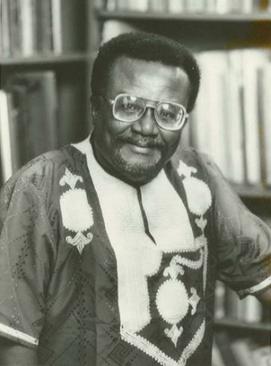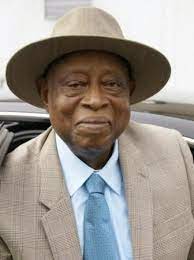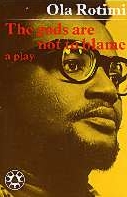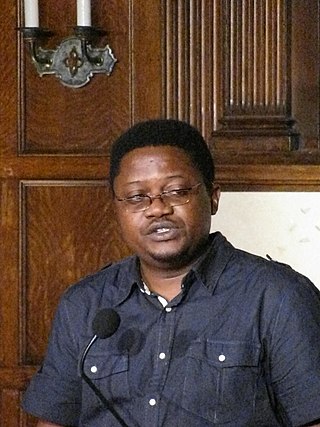Related Research Articles
Chief Obafemi Jeremiah Oyeniyi Awolowo was a Nigerian nationalist and statesman who played a key role in Nigeria's independence movement (1957-1960). Awolowo founded the Yoruba nationalist group Egbe Omo Oduduwa, and was the first Leader of Government Business and Minister of Local Government and Finance, and first Premier of the Western Region under Nigeria's parliamentary system, from 1952 to 1959. He was the official Leader of the Opposition in the federal parliament to the Balewa government from 1959 to 1963.

Olawale Gladstone Emmanuel Rotimi, best known as Ola Rotimi, was one of Nigeria's leading playwrights and theatre directors. He has been called "a complete man of the theatre – an actor, director, choreographer and designer – who created performance spaces, influenced by traditional architectural forms."
Chief Oyin Adejobi (1926–2000) was a Nigerian dramatist and actor. His name, Oyin, means "Honey". He wrote and performed in a variety of Yoruba productions on the stage, on television and in movies. He was married to actress Grace Oyin-Adejobi until his death.
Akinwumi Isola was a Yoruba playwright, novelist, actor, dramatist, culture activist and scholar. He was known for his writing in, and his work in promoting, the Yoruba language. As an actor, he was known for Agogo Eèwò (2002), Efunsetan Aniwura (1981) and Efunsetan Aniwura (2005).
Chief Ògúnwán̄dé "Wán̄dé" Abím̄bọ́lá is a Nigerian academician, a professor of Yoruba language and literature, and a former vice-chancellor of the University of Ife. He has also served as the Majority Leader of the Senate of the Federal Republic of Nigeria. Chief Abimbola was installed as Àwísẹ Awo Àgbàyé in 1981 by the Ooni of Ife on the recommendation of a conclave of Babalawos of Yorubaland.

Moses Olaiya, better known by his stage name "Baba Sala", was a Nigerian comedian, dramatist, and actor.

The Gods Are Not To Blame is a 1968 play and a 1971 novel by Ola Rotimi. An adaptation of the Greek classic Oedipus Rex, the story centres on Odewale, who is lured into a false sense of security, only to somehow get caught up in a somewhat consanguineous trail of events by the gods of the land.

Rotimi Babatunde is a Nigerian writer and playwright.
Victor Olaotan was a Nigerian actor best known for his leading role in the soap opera Tinsel.

Sango: The Legendary African King is a 1997 epic Nigerian film, written by Wale Ogunyemi, produced and directed by Obafemi Lasode. The film depicts the life and reign of the legendary fifteenth century African king Sango, who ruled as the Alaafin of Oyo and became an important deity of the Yoruba people.
Chief Peter Fatomilola is a Nigerian dramatist, film actor, poet and prolific playwright.
Yemi Shodimu is a Yoruba dramatist, television presenter, film director and filmmaker.
Antar Laniyan is a Nigerian veteran actor, film producer, and director.

Afeez Oyetoro is a Nigerian comic actor, popularly known as "Saka".
Lere Paimo, is a Nigerian film actor, film maker, producer and director.
Femi Branch is a Nigerian actor, director and producer.
Joke Muyiwa is a Nigerian film actress, honorary chief, Ph.D. holder, and lecturer. She lectures in the department of Performing Arts at the Olabisi Onabanjo University. In 2018, Joke Muyiwa was conferred with Yeye Asa of Ago Iwoye chieftaincy title by HRM Oba Ebumawe of Ago Iwoye.
Chief Muraina Oyelami is a Nigerian painter and drummer of Yoruba descent. He was among the first generation of artists to come out of the Osogbo School of Art in the 1960s. He was a drummer and actor with the theatre company of Duro Ladipo. He taught traditional music and dance at Obafemi Awolowo University from 1976 to 1987. As a musician, he trained in the dùndún and the Batá drum. He was the chief of his hometown Iragbiji.

Kòseégbé is a 1995 Yoruba drama film directed by Tunde Kelani based on a stage play of the same name by Akinwunmi Isola. The cast consisted of actors from the Obafemi Awolowo University theatre. It was released through Mainframe Films and Television Productions.
References
- ↑ Amkpa, Awam (June 2004). Theatre and Postcolonial Desires. Routledge. ISBN 9781134381333 . Retrieved 16 February 2015– via google.nl.
- ↑ "Why Ogunde's Film Village went into extinction —Kola Oyewo". Tribune Online. 2020-07-04. Retrieved 2022-03-13.
- ↑ "I Dread Polygamy - Kola Oyewo". nigeriafilms.com. Archived from the original on 15 February 2015. Retrieved 16 February 2015.
- ↑ "Kola Oyewo, a delightful glide from classroom to stage". Newswatch Times. Archived from the original on 4 March 2016. Retrieved 16 February 2015.
- ↑ "Yoruba Actor Kola Oyewo Shares His Life Story - Nollywood, Nigeria, News, Celebrity, Gists, Gossips, Entertainment". naijagists.com. Retrieved 16 February 2015.
- ↑ "My second son and I graduated same day —Kola Oyewo". tribune.com.ng. Archived from the original on 2015-02-15.
- ↑ "Kola Oyewo, A Master's Artistry". Thisday Live. Archived from the original on 15 February 2015. Retrieved 16 February 2015.
- ↑ "Kola Oyewo - nigeriafilms.com". nigeriafilms.com. Retrieved 16 February 2015.
- ↑ "My father has no social life — Kola Oyewo's son". The Punch - Nigeria's Most Widely Read Newspaper. Archived from the original on 15 February 2015. Retrieved 16 February 2015.
- ↑ "Redeemers University". P.M. News Nigeria. Retrieved 16 February 2015.
- ↑ "Celebs who engage IN OTHER VOCATIONS". Latest Nigeria News, Nigerian Newspapers, Politics. 2019-11-16. Retrieved 2020-05-29.